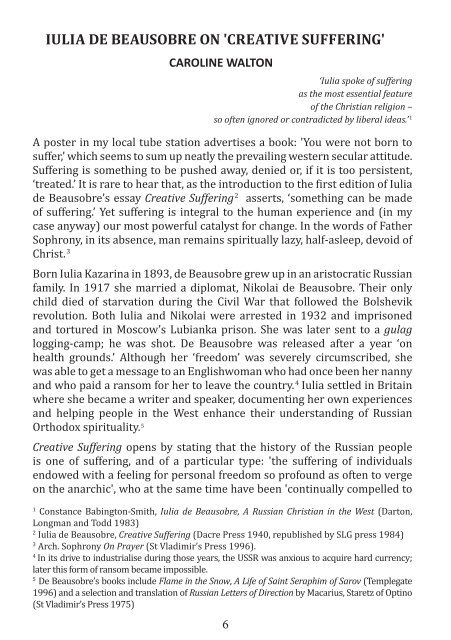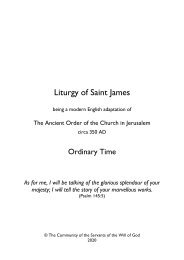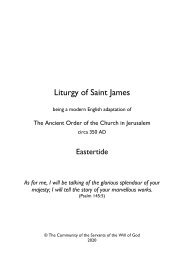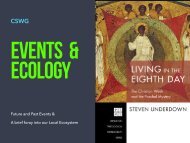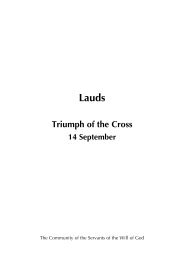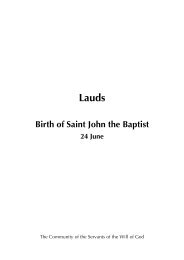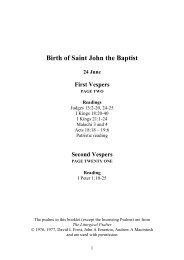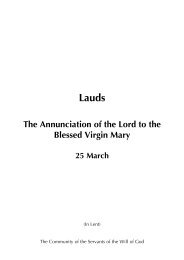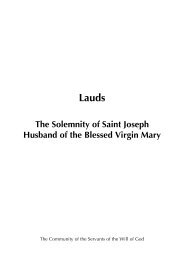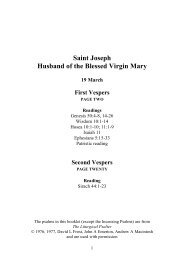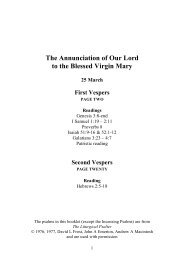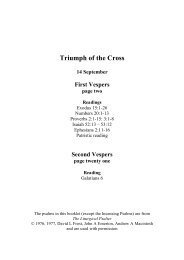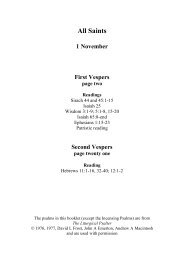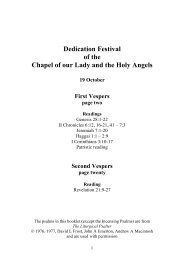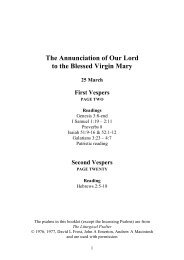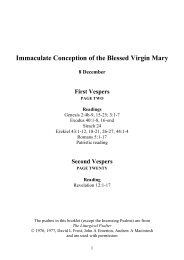In Praise of Holy Women
'Come to the Father' is the official journal of the Anglican Community of the Servants of the Will of God, Sussex, England, a contemplative monastic order for men and women founded in 1938. The aim of the journal is to maintain a dialogue between the Churches - East and West. This issue features articles on Evelyn Underhill, Julia DeBeausobre, Therese of Lisieux, Sister Joanna Reitlinger and Dorothy Day.
'Come to the Father' is the official journal of the Anglican Community of the Servants of the Will of God, Sussex, England, a contemplative monastic order for men and women founded in 1938. The aim of the journal is to maintain a dialogue between the Churches - East and West. This issue features articles on Evelyn Underhill, Julia DeBeausobre, Therese of Lisieux, Sister Joanna Reitlinger and Dorothy Day.
You also want an ePaper? Increase the reach of your titles
YUMPU automatically turns print PDFs into web optimized ePapers that Google loves.
IULIA DE BEAUSOBRE ON 'CREATIVE SUFFERING'<br />
CAROLINE WALTON<br />
‘Iulia spoke <strong>of</strong> suffering<br />
as the most essential feature<br />
<strong>of</strong> the Christian religion –<br />
so <strong>of</strong>ten ignored or contradicted by liberal ideas.’ 1<br />
A poster in my local tube station advertises a book: 'You were not born to<br />
suffer,' which seems to sum up neatly the prevailing western secular attitude.<br />
Suffering is something to be pushed away, denied or, if it is too persistent,<br />
‘treated.’ It is rare to hear that, as the introduction to the first edition <strong>of</strong> Iulia<br />
de Beausobre’s essay Creative Suffering 2 asserts, ‘something can be made<br />
<strong>of</strong> suffering.’ Yet suffering is integral to the human experience and (in my<br />
case anyway) our most powerful catalyst for change. <strong>In</strong> the words <strong>of</strong> Father<br />
Sophrony, in its absence, man remains spiritually lazy, half-asleep, devoid <strong>of</strong><br />
Christ. 3<br />
Born Iulia Kazarina in 1893, de Beausobre grew up in an aristocratic Russian<br />
family. <strong>In</strong> 1917 she married a diplomat, Nikolai de Beausobre. Their only<br />
child died <strong>of</strong> starvation during the Civil War that followed the Bolshevik<br />
revolution. Both Iulia and Nikolai were arrested in 1932 and imprisoned<br />
and tortured in Moscow’s Lubianka prison. She was later sent to a gulag<br />
logging-camp; he was shot. De Beausobre was released after a year ‘on<br />
health grounds.’ Although her ‘freedom’ was severely circumscribed, she<br />
was able to get a message to an Englishwoman who had once been her nanny<br />
and who paid a ransom for her to leave the country. 4 Iulia settled in Britain<br />
where she became a writer and speaker, documenting her own experiences<br />
and helping people in the West enhance their understanding <strong>of</strong> Russian<br />
Orthodox spirituality. 5<br />
Creative Suffering opens by stating that the history <strong>of</strong> the Russian people<br />
is one <strong>of</strong> suffering, and <strong>of</strong> a particular type: 'the suffering <strong>of</strong> individuals<br />
endowed with a feeling for personal freedom so pr<strong>of</strong>ound as <strong>of</strong>ten to verge<br />
on the anarchic', who at the same time have been 'continually compelled to<br />
1<br />
Constance Babington-Smith, Iulia de Beausobre, A Russian Christian in the West (Darton,<br />
Longman and Todd 1983)<br />
2<br />
Iulia de Beausobre, Creative Suffering (Dacre Press 1940, republished by SLG press 1984)<br />
3<br />
Arch. Sophrony On Prayer (St Vladimir’s Press 1996).<br />
4<br />
<strong>In</strong> its drive to industrialise during those years, the USSR was anxious to acquire hard currency;<br />
later this form <strong>of</strong> ransom became impossible.<br />
5<br />
De Beausobre’s books include Flame in the Snow, A Life <strong>of</strong> Saint Seraphim <strong>of</strong> Sarov (Templegate<br />
1996) and a selection and translation <strong>of</strong> Russian Letters <strong>of</strong> Direction by Macarius, Staretz <strong>of</strong> Optino<br />
(St Vladimir’s Press 1975)<br />
6


